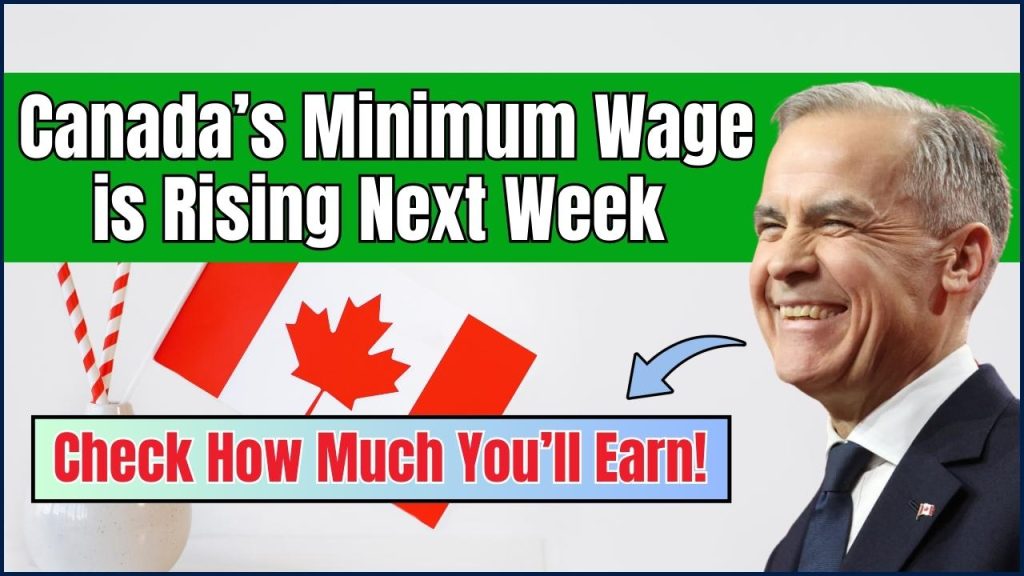Minimum Wage is Rising Next Week: Starting April 1, 2025, Canada’s minimum wage is rising for federally regulated employees, marking an important change for workers and employers alike. With inflation and cost of living continuing to climb, this increase aims to better support those working at or near minimum wage, especially in key industries like banking, telecommunications, and transportation.

If you’re wondering how this affects you, your paycheck, or your hiring practices, you’re in the right place. Whether you’re a student working part-time, a parent balancing multiple jobs, or a small business owner managing payroll, this guide will break down everything you need to know about Canada’s updated minimum wage—and what it means for your wallet or your workforce.
Minimum Wage is Rising Next Week
| Aspect | Details |
|---|---|
| Effective Date | April 1, 2025 |
| New Federal Minimum Wage | $17.75 per hour (up from $17.30) |
| Applies To | Workers in federally regulated sectors (e.g., banking, air transport) |
| Adjustment Based On | Annual inflation (Consumer Price Index) |
| Provinces/Territories May Differ | Higher provincial wages override the federal rate |
| Official Source | Canada.ca – Employment and Social Development |
Canada’s minimum wage is rising to $17.75/hour on April 1, 2025, offering a much-needed income boost to nearly a million workers across federally regulated industries. While this change may not affect everyone, it reflects the government’s commitment to ensuring wages evolve with the cost of living.
If you’re an employee, use this opportunity to revisit your budget and plan how to use your extra income wisely. If you’re an employer, make sure you’re compliant—and use the wage increase as a chance to attract and retain talent.
What Is the New Minimum Wage in Canada?
As of April 1, 2025, the federal minimum wage increases to $17.75/hour, a 2.4% bump over the previous $17.30/hour. This update is part of the federal government’s policy to adjust the wage each year based on Canada’s Consumer Price Index (CPI), ensuring workers can keep up with inflation.
But it’s important to note: This federal rate only applies to workers in federally regulated sectors. That includes industries like:
- Banking and financial services
- Postal services and courier companies
- Interprovincial transportation (airlines, trucking, railways, maritime)
- Broadcasting and telecommunications
- Federal Crown corporations and Indigenous governance organizations
If you work in retail, food service, hospitality, or healthcare, for example, your minimum wage is set by your province or territory.
How Does This Compare Across Provinces?
Minimum wage varies significantly by province and territory, and in many cases, provincial minimum wages are already higher than the federal rate. When that happens, employers must follow the higher of the two rates—federal or provincial.
Here’s a more detailed look at current minimum wages across Canada:
Minimum Wages by Province/Territory (as of April 2025)
- British Columbia: $17.85 (effective June 1, 2025)
- Ontario: $17.20
- Yukon: $17.94 (effective April 1, 2025)
- Nunavut: $19.00
- Newfoundland and Labrador: $16.00 (effective April 1, 2025)
- Nova Scotia: $15.70 (increasing to $16.50 in October 2025)
- New Brunswick: $15.65 (effective April 1, 2025)
- Quebec: $16.10 (effective May 1, 2025)
- Alberta: $15.00 (no planned increase announced yet)
- Manitoba: $15.80
- Saskatchewan: $15.00
- Prince Edward Island: $16.00
- Northwest Territories: $16.70
Why Is Minimum Wage Increasing?
The federal government ties wage increases to inflation, using the Consumer Price Index (CPI) as the key metric. In simple terms, when the cost of groceries, housing, fuel, and other daily essentials goes up, the minimum wage is adjusted accordingly to ensure people don’t fall behind financially.
Raising the minimum wage also serves broader goals:
- Improving income equality
- Reducing reliance on social assistance
- Boosting worker morale and productivity
- Stimulating the economy through increased consumer spending
According to Statistics Canada, inflation averaged 3.1% in 2024. While the minimum wage increase of 2.4% doesn’t match that exactly, it is still a step toward helping workers recover from ongoing cost pressures.
Who Will Benefit from the Federal Increase?
This update impacts around 955,000 Canadians employed in federally regulated industries. While not the majority of the workforce, this group includes workers across various income levels and job types, from front-line support staff to skilled tradespeople.
Some examples of who will benefit:
- A young adult working as a call center agent in a telecom company
- A baggage handler at an international airport
- A letter carrier or mail processor at Canada Post
- A maintenance technician for a federal railway
- An administrative worker in a federal Indigenous organization
How to Calculate Your New Minimum Wage
Let’s break it down with real-world math. Suppose you work 40 hours per week in a federally regulated job. At $17.75/hour, your gross weekly pay becomes:
17.75 × 40 = $710/weekMultiply that by 4 weeks, and you’re earning around $2,840/month or $36,920/year, before taxes and deductions.
Let’s compare it with the previous rate of $17.30/hour:
17.30 × 40 = $692/week → $35,984/yearThat’s an annual boost of $936—which could go toward food, rent, student loan payments, or even emergency savings.
If you’re working part-time at 20 hours a week:
20 × 17.75 = $355/week → $1,420/month → $17,040/yearThat small raise can still make a noticeable difference in your budget.
Practical Tips for Employers
If you’re running a business in a federally regulated industry, it’s essential to prepare well in advance. Here’s how:
- Update payroll software: Make sure wage updates are reflected in your next payroll cycle.
- Review job contracts: Ensure employee compensation reflects the new wage where applicable.
- Train your HR/payroll team: Keep staff aware of compliance requirements to avoid errors.
- Budget for increases: Factor in higher wages when planning operational costs for 2025.
- Communicate clearly: Let employees know about the wage hike so expectations are clear and morale is high.
The Canada Labour Code mandates adherence to minimum wage rules. Failing to comply could result in penalties, fines, and even audits.
What Students and Part-Time Workers Should Know
Many federally regulated part-time workers are students, new immigrants, or young professionals gaining early career experience. This wage bump can go a long way toward covering rising expenses like:
- Rent and utilities
- Food and transit costs
- Tuition fees or student loan interest
For example, working 15 hours a week during the semester now brings in:
15 × 17.75 = $266.25/week → $1,065/monthThat can help students become more financially independent while gaining valuable job experience.
Could This Raise Lead to Inflation?
It’s a valid question—and a common one. While higher wages can raise costs for businesses, economists generally agree that modest, inflation-linked wage hikes like this one don’t lead to runaway inflation.
In fact, boosting low-income wages can have positive ripple effects:
- Encourages spending, supporting local businesses
- Reduces demand for income support programs
- Improves worker retention, lowering hiring costs
As long as wage growth stays in line with productivity and inflation, the economy remains stable—and often stronger.
Canada CRA $3200 Pension Boost In April 2025 – Check Payment Date & Eligibility
Canada $2254 OAS Increase Payment in March 2025 – Is this Really Coming? Check Payment Dates
Canada Drops Major PGWP Rule – No More Field-of-Study Restrictions for International Students
FAQs About Minimum Wage is Rising Next Week
Who sets the minimum wage in Canada?
Both the federal government and provincial/territorial governments set minimum wages. The higher of the two always applies, depending on the industry you work in.
What if my province’s wage is lower than $17.75?
If you’re not in a federally regulated industry, your province’s minimum wage applies—even if it’s below the federal minimum.
Are employers required to notify employees?
Yes. Employers should clearly inform staff about wage changes and ensure documentation, contracts, and payroll are up to date.
Does this apply to interns or apprentices?
It depends. Unpaid internships aren’t covered. But paid internships and apprenticeships in federally regulated sectors usually qualify for minimum wage.
Will this increase lead to job losses?
Evidence shows that modest wage hikes don’t lead to job cuts in federally regulated sectors, which tend to be large, stable organizations.











